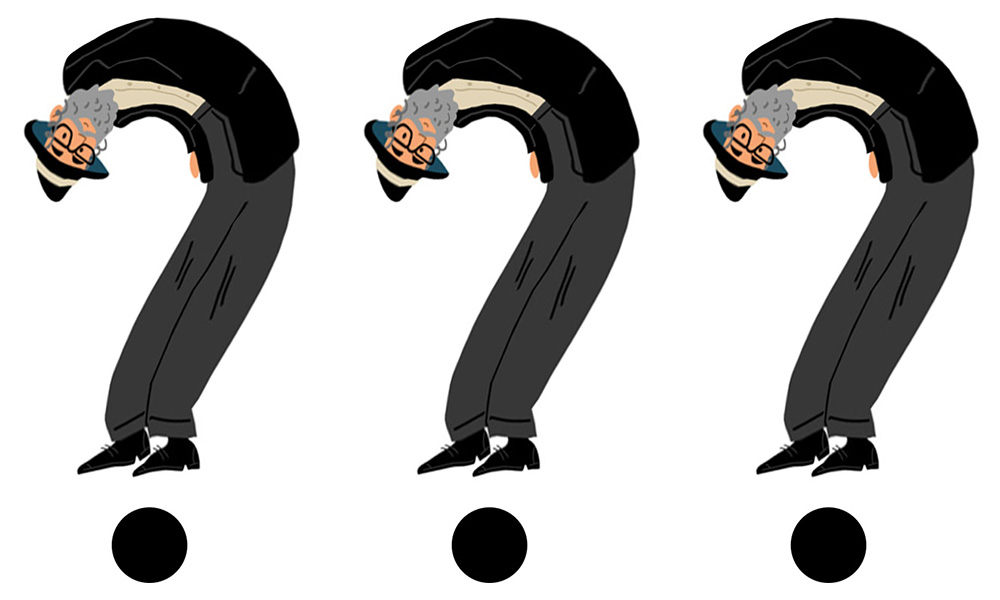In recent Jewish history, the expression “Yes, but is it good for the Jews?” has morphed from plaintive cry to freighted question to laugh line. But now, as war rages on in Gaza and Lebanon, and hatred of Jews is on the rise, the phrase is returning to its semi-serious roots.
“It is still good for a laugh [but] it’s also still loaded with meaning,” says Eddy Portnoy of the YIVO Institute for Jewish Research in New York City. “Jews who are integrated into general society would like to feel that such a phrase is no longer necessary. But with the current uptick in antisemitism, it is still worth asking, though now the humor is bittersweet. Or possibly just bitter.”
The origin of “Yes, but is it good for the Jews?” is unclear. Portnoy and other Yiddish scholars say that unlike other well-known Jewish expressions (“You should live to 120” or “From your mouth to God’s ear”), the saying is neither rooted in Yiddish nor derived from Hebrew.
Versions of the phrase in English date back at least to 1824. That year, the chronicle of the London Society for Promoting Christianity Among the Jews recorded an exchange in Jerusalem in which a certain Rabbi Mendel was asked about America, described as the only place in the world where Jews were not persecuted. Rabbi Mendel replied it was “not good for the Jews” to enjoy too many privileges, lest they “wax fat and kick,” a reference to a line in Deuteronomy.
The phrase got a boost in 1921 when Winston Churchill uttered a variation. At the time Churchill was colonial secretary in charge of British policy in the newly acquired Mandate of Palestine, spoils from the defeat of the Ottoman Empire in World War I. In a meeting in Jerusalem with a prominent Arab leader, Churchill reiterated support for the Balfour Declaration, which supported the establishment of a Jewish state in Palestine, stating a homeland “will be good for the world, good for the Jews and good for the British Empire. But we also think it will be good for the Arabs who dwell in Palestine, and we intend that it shall be good for them…”
Churchill’s “good for the Jews” was seized upon by the Jewish press and before long the phrase-turned-query entered into the Jewish lexicon, natural for a people with a long tradition of answering questions with questions. In his monumental A Treasury of Jewish Folklore (first published in 1948), Nathan Ausubel tells a story of a boy on New York’s Lower East Side running home to tell his grandfather that Babe Ruth hit three home runs in one game. “Tell me,” asked the old man, “what this Babe Ruth did—is it good for the Jews?” In 1938, a Canadian-Jewish publication explored why news of Nazi persecution of Jews yielded high levels of anxiety and antipathy in the Jewish world outside Germany. The headline: “Is Publicity Good for the Jews?”
Miriam Udel, director of the Tam Institute for Jewish Studies at Emory University, says the key is the placement of the word “but.” Its use “betrays an awareness that as a vulnerable minority…Jewish interests are sometimes oblique if not counter to those of the mainstream,” she explains.
Over time, the humor of the question appears to have developed along generational lines. The once-serious query of older Jews buffeted by shifting tides of antisemitism was mocked by younger generations, more secure in their Jewish identity. Jonny Geller, a prominent British literary agent, recalled his grandmother viewing the world “purely through this lens—‘yes, but is it good for the Jews?’” In 2006 Geller penned a book offering a satiric look at Jewish life with the title: Yes, but is it good for the Jews? “I wondered what it would be like to view the whole world…through that prism?” he says.
The “good-for-the-Jews” line has been a comedy-world staple for decades. On a 2010 episode of Fresh Air, host Terry Gross queried comedian Sarah Silverman about whether her brand of humor was good for the Jews. Yes, Silverman replied, “I think that whenever a Jew has any kind of notoriety, good or bad, the Jews find it to be good. You know, it’s like…‘Son of Sam’ [a reference to the 1970s era serial killer]—Jewish!”
But it’s not just comedy. Over the years, a similar inquiry has been posed in regard to an eclectic mix of everyday subjects, from Jared Kushner to Israel, from Christmas to gefilte fish. October 7, however, arguably deflated the humor of the question.
The line remains in use, but its emotional underpinning has altered. Geller says he would not write Yes, but is it good for the Jews? today, “nor, I suspect, would it be published” if somebody else did. Geller doesn’t think the book would garner the same reactions now. “That both saddens me and also makes me think we can’t give up on that essential Jewish characteristic—humor,” he says. “We must fight to reclaim it devoid of politics or hate.” That, hopefully, isn’t just good for the Jews, but good for everyone.




Interesting article! A little history I was unaware of
Fantastic column. I have a friend: smart, professional, accomplished and gracious Jewish woman who uses that phrase surprisingly often. I laugh at it, but this history puts it in useful context.